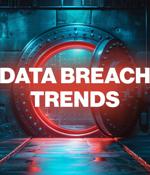Security News

ESET researchers have discovered a series of attacks that took place in Europe from May 2022 to March 2024, where the attackers used a toolset capable of targeting air-gapped systems, in a...

These 15 cyber attacks or data breaches impacted large swaths of users across the United States and changed what was possible in cybersecurity.

The Federal Communications Commission (FCC) announced a $31.5 million settlement with T-Mobile over multiple data breaches that compromised the personal information of millions of U.S. consumers. [...]

Implementing multi-factor authentication, supplier risk-management frameworks, and staff security training could help to reduce data breaches.

Now it's the default for all new accounts Snowflake continues to push forward in strengthening its users' cybersecurity posture by making multi-factor authentication the default for all new accounts.…

Shadow apps, a segment of Shadow IT, are SaaS applications purchased without the knowledge of the security team. While these applications may be legitimate, they operate within the blind spots of...

The Federal Trade Commission (FTC) proposes a $2.95 million penalty on security camera vendor Verkada for multiple security failures that enabled hackers to access live video feeds from 150,000...

Data breaches have become an increasingly severe threat, with recent reports highlighting a surge in their frequency and cost. Understanding the latest trends and statistics surrounding data...

The Critical Infrastructure Edition of the 2024 Data Threat Report, by technology organisation Thales, found that ransomware incidents at critical infrastructure organisations are on the rise globally - even as these organisations explore the applications and data risks of AI. In a conversation with TechRepublic, Thales' ANZ Director of Data Security Erick Reyes said ransomware attackers are most likely to target critical infrastructure organisations that hold critical data. Critical infrastructure organisations juggling ransomware and AI. Thales' report found that 42% of critical infrastructure organisations in all global markets surveyed were breached at some point in the past - 7% lower than all industries.

IBM recently released its annual Cost of a Data Breach report, revealing that the average cost of a data breach in Australia reached a record-high of AUD $4.26 million in 2024. Initial attack vectors: Phishing was the most common initial attack vector, accounting for 22% of breaches and costing businesses AUD $4.35 million per breach on average.